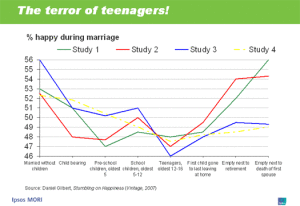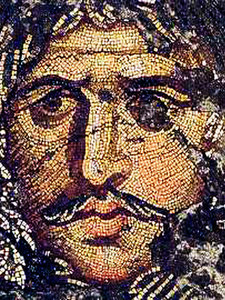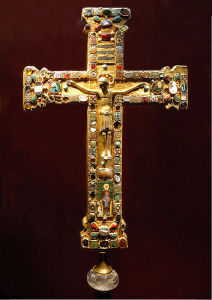Something curious happens when we track satisfaction over the course of our lives. Couples meet, fall in love, get married and life could not be more wonderful. Then they have children and satisfaction falls. It plummets. Happiness only begins its rise once again after the little ones are hatched and fledged and flown.
When I show this data to parents, nervous laughter fills the room. They recognize something which is impolite to admit, something misleading but that touches truth. When I show it to my students at North Carolina State University, they are driven to existential despair. “Could it be that my parents are happier now that I am gone . . . ?”
This does not happen to all of us. These are the big numbers. These are the general statistics about what happens among groups who are polled about such things.
More importantly it is not, of course, the whole story. As tired and spent and utterly exhausted as I was in those days, I would not dream of trading those moments when my son or one of girls would look up, mashed potatoes in hair and face and god-only-knows-where-else, and say “I wuv you daddy.” Children bring deep, deep joy to our lives. They give us meaning beyond ourselves. And more than anything, they teach us in a very real sense that love is caring for someone more than we care for ourselves.
But deep love breeds deeper worry. Furthermore, kids are a lot of work. If we are not careful, they can squeeze out every other joy we have in our lives. We risk waking up one day looking across the table at the woman we married with her now leaking breasts and stretch marks, or she looking back at a tired man with thinning hair and a thickening paunch, and we realize that we had traded our common life dreams for a shared “to do” list. There is too much to do. Good things. Important things. But there is simply too much.
So often that sag in the middle of our lives seems as lost and engloomed as when the dark ages descended upon the heart of Europe. A time almost erased by history, after the fall and sack of Rome when a whole continent was vulnerable to famine, pestilence, persecution and new barbarians.
When the plagues and heathens of middle age have broken our Pax Domus, our peaceful home, this stage of our lives can feel lost too. Children are not the only imperatives pulling at us. Maybe our parents have begun their decline. We venture into that unclear space where their competence has frayed yet not unraveled, and so not a single answer is clear. Maybe we wake up in our jobs to find ourselves standing on a plateau or our heads pressed against a ceiling, and everything we’ve striven for, everything we thought mattered, even what “work” means for us, is thrown into question.
And when the Vandals and Visigoths who breached the castle walls are our own children, hopelessness is the most debilitating plague. We watch as pubescence plucks the classical sweetness from them, how it tosses them into a dark night of confusion. It is not the gothic color of their clothes or lipstick that brings darkness over the middle years of our lives. It is the shade of their thoughts; thoughts from which we are given no chance for rebuttal. It is the temptation of their peers. It is the fact that innocence is gone, but naïveté is not.
However, historians tell us the dark ages were not entirely dark. Those middle years sparkled with the gold and jeweled buckles and crosses of barbarians. Great truths were writ in ruins and carved on stones for Odin to find. There was Aquinas and Dante, the Book of Kells and the Hunterston Brooch.
Gothic invaders carried with them the very seeds of cathedrals and Marco Polo traveled to worlds that previously did not exist. Meanwhile at the outer edges of what we once called home, a mysterious commander and king called Arthur lived a life of legends and gave us all hope.
Not every charm or joy is jotted down in the ledger book. Not every shimmering moment is captured by the lines penciled in on graphs to mark our median mood decade-after-decade. Just as the dark ages had their gilded and glistening truths, so does the middle epoch of our lives. It will vary from person-to-person. It could be the lack of restraint in a toddler’s full-bodied hug. It might be the virgin confidence seeping from your teen’s awkward limbs, revealing a tenderness that has not left, and taking us back to when we too stood with anticipation and confusion at the crossroads of adulthood and infancy. It may be an aging parent’s fingers gripping your arm, searching for something stable upon which they can depend.
Whatever shining things dot our lives like dew glistening in a spider’s web, our story is a story of change. This is a time where life asks something of us. The roles are shifting; at work, at home, as a parent and spouse. We become the executors of new responsibilities, the inheritors of a new future.
In the midst of this exhaustion and chaos where so little is clear, let the cobwebs hang undusted in the corner. Your children will find them and infuse them with magic. Court your spouse again as if you were interested strangers. Look for the hands that reach out to you with their insistence that you are needed, or with their offers of support. And remember, just as the dark ages gave birth to the great Renaissance and Age of Discovery, the data points that map the curvature of our lives’ journeys ticks steadily upward again to our own reawakening.
No matter where you sit on the arch of your own history, there is beauty and goodness and joy in that very same spot. Look for it. Savor it. No matter what dark moments demand your attention in the present tense, there is a brighter light on your horizon, a new era dawning. Both history and science have proven it.









Wisdom from a young man. Treasure the
Moments.
Thanks Jane!
What a beautiful essay. So poetic, Sean. And so utterly hopeful!
-David
Thank you David. I especially appreciate it knowing how much hope you spread in the world.
Very mice, Sean. Timely for a parent like me raising kids.